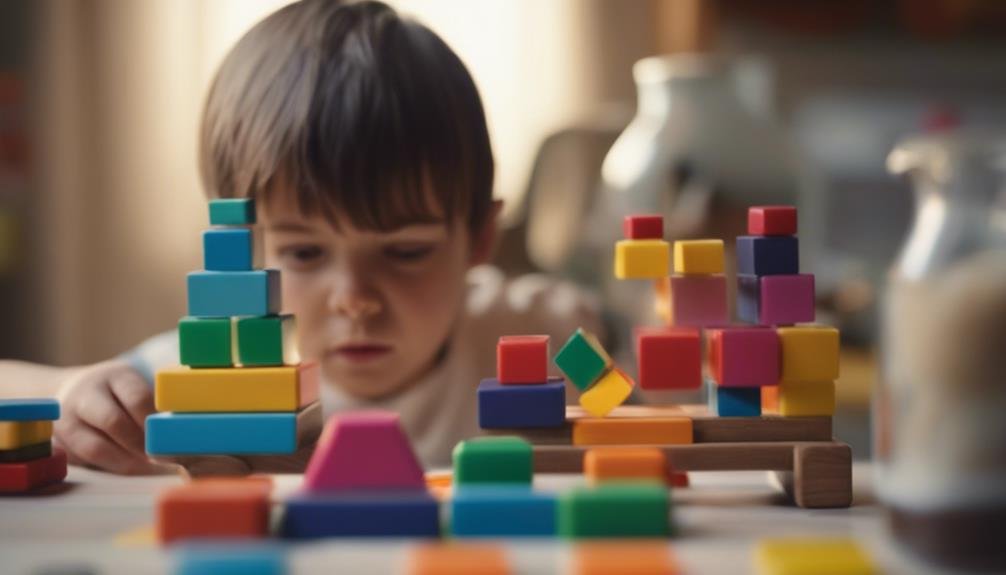"Cherishing Little Steps - A Haven for Baby and Family Journeys"
Essential Life Skills for Young Children: Teaching Tips for Parents
Mastering essential life skills is important for the development of young minds. As a parent, guiding your child in acquiring these fundamental abilities can greatly impact their future success and well-being.
From effective communication to critical thinking, teaching these skills early on lays a solid foundation for their growth. But how can you make sure your child learns these skills in a fun and engaging way?
Stay tuned to discover practical tips that can help you empower your little one with the tools they need to navigate life with confidence.
Key Takeaways
- Create a supportive environment for children to enhance communication skills.
- Foster creative problem-solving abilities through hands-on activities and positive mindset.
- Teach emotional regulation techniques like mindfulness and breathing exercises.
- Encourage teamwork and collaboration to develop decision-making skills in young children.
Communication Skills

When teaching young children communication skills, it's essential to create a supportive and interactive environment that encourages them to express themselves confidently and effectively. Active listening plays a critical role in developing strong communication skills in children. By actively listening to what your child has to say, you show them the importance of respectful and attentive communication. Encourage your child to express their thoughts and feelings openly, validating their emotions and opinions.
In addition to active listening, teaching effective speaking is equally important. Help your child articulate their thoughts clearly and confidently. Encourage them to use words to express themselves rather than resorting to frustration or anger. Model good communication by speaking clearly and calmly yourself, showing them how to communicate effectively in various situations.
Problem-Solving Abilities
To enhance problem-solving abilities in young children, encourage them to approach challenges with a positive mindset and a willingness to explore different solutions. Creative problem solving is a valuable skill that can be nurtured through hands-on activities where children can actively engage and experiment with various solutions. By providing opportunities for your child to think outside the box and try different approaches, you are helping them develop critical thinking and problem-solving skills that will benefit them throughout life.
| Benefits of Creative Problem Solving | Examples of Hands-On Activities |
|---|---|
| Enhances critical thinking skills | Building puzzles or Lego structures |
| Encourages innovation and creativity | Science experiments at home |
| Fosters resilience and perseverance | Designing and building a fort |
| Boosts confidence in tackling challenges | Creating a scavenger hunt |
| Promotes teamwork and collaboration | Planning and organizing a family game night |
Engaging your child in these activities not only makes learning fun but also equips them with the necessary skills to tackle real-world problems effectively.
Emotional Regulation Techniques

Engage your child in simple yet effective emotional regulation techniques to help them manage their feelings and reactions in a healthy way. Teaching your child how to handle their emotions is a valuable life skill that will benefit them greatly as they grow.
- Mindfulness practice: Encourage your child to be present in the moment by engaging in mindfulness activities such as guided meditation or focusing on their senses. This can help them become more aware of their emotions without being overwhelmed by them.
- Breathing exercises: Teach your child breathing techniques like deep belly breathing or square breathing. These techniques can help them calm down when they're feeling anxious or upset, providing a sense of control over their emotions.
- Calming techniques: Explore different calming strategies with your child, such as listening to soft music, drawing, or going for a walk. Finding what works best for them can empower them to regulate their emotions effectively.
Teamwork and Collaboration
Encouraging children to work together and collaborate on tasks fosters essential skills for effective teamwork and communication. Group projects provide an excellent opportunity for kids to learn how to cooperate, share ideas, and communicate with their peers. It teaches them the importance of listening to others, compromising, and working towards a common goal. Through group projects, children also develop problem-solving skills as they navigate different perspectives and ideas within the team.
Peer support is another critical aspect of teamwork and collaboration. Children learn to encourage and help each other, building a sense of camaraderie and mutual respect. When kids support their peers, they not only strengthen their relationships but also enhance their own learning by explaining concepts to others and receiving feedback in return. Peer support fosters a positive classroom environment where children feel valued and supported by their classmates.
Decision-Making Skills

Developing decision-making skills is essential for young children as it empowers them to navigate various situations with confidence and autonomy. Teaching your child how to make choices and judgment calls will help them become independent thinkers and problem solvers.
Here are three ways you can support your child in developing these vital skills:
- Encourage Independence: Allow your child to make age-appropriate decisions, such as choosing their clothes or snacks. By giving them the freedom to make choices, you help foster their decision-making abilities.
- Discuss Consequences: When your child makes a decision, discuss the possible outcomes with them. Understanding the consequences of their choices will teach them to think ahead and consider the impact of their actions.
- Provide Guidance: Offer guidance and support when your child is faced with a tough decision. Help them weigh the pros and cons, ask questions to prompt critical thinking, and encourage them to trust their instincts.
Critical Thinking Strategies
To enhance your child's critical thinking skills, encourage them to question assumptions and seek evidence to support their reasoning. Analytical reasoning involves breaking down complex problems into smaller parts to understand them better. Encourage your child to ask 'why' and 'how' when faced with a challenge. This will help them develop a deeper understanding of the situation and consider different perspectives.
Creative problem solving is another essential aspect of critical thinking. Encourage your child to think outside the box and explore various solutions to a problem. Encourage them to brainstorm ideas and consider unconventional approaches. This will help foster their creativity and adaptability in finding solutions.
As a parent, you play a pivotal role in nurturing these skills in your child. Engage them in discussions that require critical thinking, such as asking them to explain their reasoning behind a decision. By fostering analytical reasoning and creative problem-solving skills, you're equipping your child with valuable tools to navigate the complexities of the world around them.
Frequently Asked Questions
How Can Parents Encourage Young Children to Express Their Emotions in a Healthy Way?
To help your little ones express emotions healthily, create a safe space for open dialogues. Encourage drawing, journaling, or talking about feelings. Model healthy emotional expression yourself. Validate their emotions and teach coping strategies.
What Are Some Effective Strategies for Teaching Young Children How to Handle Conflict With Their Peers?
When handling conflict with peers, remember to listen actively, express feelings calmly, and find solutions together. Conflict resolution skills are essential for healthy peer relationships. Practice empathy, compromise, and communication for positive interactions.
How Can Parents Help Young Children Develop Empathy and Kindness Towards Others?
To foster empathy and kindness in young children, engage in role-playing activities to help them understand others' feelings. Use storytelling exercises to teach compassion and model kindness in daily interactions. Your guidance shapes their values.
What Are Some Ways to Teach Young Children the Importance of Respecting Diverse Opinions and Perspectives?
To teach young ones about respecting diverse opinions and perspectives, start by honing their listening skills and fostering open-mindedness. Encourage empathy building and perspective taking through discussions, stories, and role-playing, showing them the beauty of embracing differences.
How Can Parents Support Their Children in Developing Resilience and Coping Skills During Challenging Situations?
Feeling overwhelmed? How can you support your child in building resilience and coping skills? Show empathy, listen actively, encourage problem-solving, and praise effort. Create a safe space to express emotions and teach healthy ways to manage stress.
Conclusion
As parents, you play an important role in helping your children develop essential life skills. By teaching communication, problem-solving, emotional regulation, teamwork, decision-making, and critical thinking, you're setting them up for success in the future.
So keep guiding, encouraging, and supporting them every step of the way. Remember, with your love and guidance, they'll grow into capable, resilient individuals ready to take on whatever challenges life may bring.
Keep nurturing those skills, and watch them flourish.


